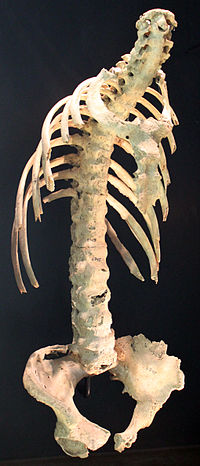
Photo from wikipedia
Axial spondyloarthritis (axSpA) is an inflammatory disease associated with significant diagnostic delays. A previous evaluation of confidence, awareness and knowledge of axial spondyloarthritis (Steen et al, 2021) found physiotherapists lacked… Click to show full abstract
Axial spondyloarthritis (axSpA) is an inflammatory disease associated with significant diagnostic delays. A previous evaluation of confidence, awareness and knowledge of axial spondyloarthritis (Steen et al, 2021) found physiotherapists lacked adequate consideration of axSpA in back pain assessments and of awareness of features that raise suspicion. Since the previous survey, professional education on axSpA has occurred. Furthermore, first contact practitioners (FCPs) are now widely established in general practice and key in supporting earlier recognition. The aims of this study were to evaluate FCP and physiotherapists' and re-evaluate musculoskeletal physiotherapists' awareness, knowledge, and confidence in recognising features of axSpA and of criteria supporting referral to rheumatology to compare to previous research which suggested the need for further professional education. Using the previous strategy (Steen et al., 2021), an online survey was undertaken with a combined approach. This included back pain presentation vignettes with features of axSpA, non-specific low back pain (NSLBP) and radicular syndrome to evaluate screening knowledge, clinical reasoning and recognition, and section two with questioning on features of suspected axSpA. Analysis used descriptive statistics and content analysis informed by advocated criteria and resources, including ASAS and NICE guidance, that support recognition and referral of axSpA in clinical practice. There were 165 completed responses analysed. Only 73% (n = 120/165) of respondents recognised the axSpA vignette compared to NSLBP (91% [n = 80/88]) and radicular syndrome (88% [n = 68/77]). A trend towards improvement in axSpA recognition was demonstrated compared with previous data. FCPs performed slightly better, with 77% (n = 67/87) of respondents recognising the axSpA vignette. Adequate awareness of national referral guidance was evident in only 55% of ‘clinical reasoning’ and 6% of ‘further subjective screening’ responses. There was reduced awareness of NICE guidelines on spondyloarthritis compared with back pain guidelines; however, more awareness of all guidelines was found amongst FCPs. More knowledgeable responses were associated with familiarity with the NICE spondyloarthritis guidance (2017) and National Back and Radicular Pain Pathway (2017), CPD on LBP and spondyloarthritis, NHS employment, FCP role, ≥60% LBP caseloads, GP referrals and professional experience. There is still misplaced confidence in recognising clinical features of axSpA and when to refer compared to knowledge levels demonstrated. High importance is still given to inflammatory markers, HLA B27 positivity; however, appropriately, less emphasis is given to gender. Musculoskeletal physiotherapists demonstrated some improved knowledge and awareness of axSpA compared with previous findings. Consideration of axSpA is still not universal in musculoskeletal physiotherapists' or FCPs' approaches to persistent back pain assessments, along with a lack of awareness of national referral guidance for suspected axSpA. This study highlights the need for ongoing professional education to make screening and referral criteria for suspected axSpA core knowledge in musculoskeletal clinical practice to support earlier diagnosis and better outcomes. Disclosure E. Steen: None. M. Cairns: None. C. McCrum: None.
Journal Title: Rheumatology
Year Published: 2023
Link to full text (if available)
Share on Social Media: Sign Up to like & get
recommendations!